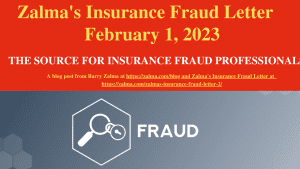Zalma’s Insurance Fraud Letter – February 1, 2023

See the full issue here.
See the full video at https://rumble.com/v27r4rk-zalmas-insurance-fraud-letter-february-1-2023.html and at https://youtu.be/2gDf1Se5wzw
The Source for Every Insurance Fraud Professional
In this, the third issue of the 27th year of publication ZIFL provides the following articles:
Soft Fraud
No Less a Fraud than so-called Hard Fraud
For reasons known only to governmental entities some insist on categorizing fraud into both “hard” and “soft” fraud. By so doing the governmental entities that so categorize fraud make one type of fraud less heinous and less criminal than the other. Fraud, whether categorized “soft” or “hard,” are criminal and if a person is tried and convicted of fraud both can be sent to jail for the same amount of time.
The types of insurance fraud some call “soft fraud” is found in every type of claim presented to an insurer.
Soft fraud, which is sometimes called opportunity fraud, occurs when a policyholder or claimant exaggerates a legitimate claim…. According to the Insurance Research Council, soft fraud “Is far more frequent than hard fraud… Because of the frequency of soft fraud, it adds more to overall claims cost than hard fraud does.” [Article by the Idaho Fraud Bureau at http://www.idfbins.com/tips-safe-living/soft-fraud; report of the Coalition Against Insurance Fraud at http://www.insurancefraud.org/learn_about_fraud.htm; article by Arkansas Department of Insurance at http://www.fightfraud.arkansas.gov/]
Soft fraud occurs when a policyholder exaggerates an otherwise legitimate claim or when an individual applies for an insurance policy and lies about certain conditions or circumstances to lower the policy’s premium.
The reality is that Soft Fraud is a criminal violation and a breach of a material condition of the policy. It contributes to increased insurance costs. As a result of increased insurance costs, millions of Americans cannot afford sufficient insurance coverage. One cannot commit an innocent or partial fraud any more than one can be partially dead. Once fraud is committed the contract of insurance is violated and voidable and the crime has been committed.
See the full issue here.
How Not to Commit Arson
Most people do not understand how hard it is to set fire to a house that will destroy the entire dwelling and its contents. Most residences simply do not have sufficient combustibles in the right place to allow for a sustained fire. Many homes, especially the more modern ones, have fail-safe devices everywhere that make accidental fires a thing of the past.
An Insured decided that the only possible means of escaping his mortgage was to burn down his house. Being a rather imaginative fellow, he decided to also make the fire look like an accident.
On leaving his house in the afternoon, he opened the gas jets on the stove, blew out the pilot on his gas dryer and water heater, and set the thermostat on his electronically ignited furnace to 80 degrees Fahrenheit. It was a hot Summer day, but he assumed it would eventually cool off a little, the thermostat would kick on the furnace, and the electronic starter would cause a gas explosion that would destroy the entire house. What he did not count on was Southern California’s Santa Ana Winds that brought heat from the desert and kept the outside temperature in the hundreds all day and into the night. The Insured was shocked that a nosey neighbor with clear sinuses would smell the gas, turn it off at the meter, and save the house.
Of course, when the Insured returned home, he had to hide his disappointment that the house was still there. Undaunted, however, he tried again the next week. This time he took no chances. He went to the hardware store and bought a case of Coleman cooking fuel and spread it throughout the house. Then he tore up a book of paper matches so that there was no cover, only matches. He lit a cigarette and placed it low between the matches and left the house confident that when the cigarette burned down it would ignite the match heads and burn down the house. He was again sorely disappointed when he returned home to find the house still there.
See the full issue here.
Imposter not a Customer
Theft by Fraud, Trick or Device Not Covered
BASIC FACTS
Plaintiff, a company that provides information technology services, brought suit against defendant for breach of contract and bad-faith denial of a claim under MCL 500.2006 after defendant denied plaintiff’s insurance claim for computer equipment that was fraudulently procured by an imposter.
In July 2020, plaintiff received an inquiry from an individual purporting to be from the purchasing department for Macomb County. The individual stated that Macomb County was interested in purchasing new computer equipment and asked plaintiff to facilitate the transaction. Plaintiff did so only to later discover that Macomb County never ordered the equipment. Plaintiff submitted a claim for the loss to defendant for $165,195, which defendant denied.
See the full issue here.
Good News from The Coalition Against Insurance Fraud
A chiro lied he had a medical license while inflating patients’ medical conditions for his cut of more than $3.5M of federal and private disability payments. Despite lacking a license, Thomas G. Hobbs bought and dispensed prescription meds, gave injections and dispensed meds intravenously to patients. The Arnold, Mo. man also fraudulently helped patients receive disability money. He charged patients between $2K-$8.6K to prepare disability forms. He also coached them to lie that they couldn’t perform basic activities such as lifting, standing, walking, sitting, remembering and taking care of personal needs. And Hobbs used a fake medical license number so his medical opinions had more weight than federal and private insurance medical experts. He even forged medical reports to give the appearance he had a long history with the patients. Many of his claimed services were phantom, unneeded or provided by unqualified persons to make it seem patients were disabled. The procedures included MRIs, CT scans and heart tests. Hobbs also submitted numerous claims for office visits when he hadn’t provided the required face-to-face patient evaluation and case management. Hobbs pled federally guilty and will be sentenced April 19.
Plus many more reports.
See the full issue here.
Heath Insurance Fraud Convictions
Donald Booker of Charlotte, North Carolina, was convicted of conspiracy to commit health care fraud, multiple violations of the Anti-Kickback Statute, money laundering conspiracy, and money laundering.
Booker owned United Diagnostics Laboratories (UDL), a urine toxicology testing laboratory, and United Youth Care Services (UYCS), a mental health and substance abuse treatment services provider. Booker’s co-defendant, Delores Jordan, pleaded guilty to health care fraud conspiracy and money laundering conspiracy in December and owned Legacy Housing, a housing provider.
From January 2016 to August 2019, Booker and his co-conspirators defrauded the North Carolina Medicaid program of more than $11 million. Jordan would recruit people who were Medicaid eligible for housing and other programs and services. They would require beneficiaries to submit urine samples when they enrolled in the program, and they provided the samples to Booker and UDL for testing that wasn’t medically necessary. Booker paid illegal kickbacks to Jordan and others in exchange for these urine samples. Booker and Jordan also laundered the proceeds to conceal and disguise the nature and source of the illegal kickback payments. Plus dozens more reports of convictions.
See the full issue here.
Eleventh Circuit Allows Retrial of Esformes
In United States Of America v. Philip Esformes, Nos. 19-13838, 19-14874, United States Court of Appeals, Eleventh Circuit (January 6, 2023) Philip Esformes challenged his convictions of healthcare fraud, illegal kickbacks, and money laundering and the related restitution award and forfeiture judgment. After Esformes filed this appeal, President Trump commuted his sentence of imprisonment and rendered any challenge to it moot.
See the full issue here.
Other Insurance Fraud Convictions
Mark Biegler, a Helena, Montana-based commercial insurance broker has been sentenced to 90 days in jail, given a 10-year suspended prison sentence and ordered to pay $150,000 in restitution for insurance fraud.
Biegler pled guilty to six felony charges of insurance fraud and theft, according to the state’s Commissioner of Securities and Insurance, Office of the Montana State Auditor.
Mr. Biegler previously worked at Hub International Ltd., but he was terminated by Hub in 2017, a spokeswoman for the brokerage said in an email. The charges relate Premier Insurance LLC, an agency he established, she said.
According to court papers filed in state court in 2020, between September 2018 and September 2020, Mr. Biegler, who held insurance and surplus lines insurance producer licenses, was charged with criminal insurance fraud and theft of insurance premium against five businesses.
He was also charged with fraud for filing false written statements to State Farm Mutual Insurance Co. in May 2017.
The specifics of the fraud allegations vary, but in one case he was charged with having a business pay a premium directly to him instead of to an insurer and altering a declaration by falsely stating the business had insurance coverage.
See the full issue here.
Motion About McClenny, Moseley & Associates
Lawyer Matthew D. Monson of The Monson Law Firm, LLC filed the following motion, a complete copy of which is available at https://www.claimsjournal.com/app/uploads/2023/01/Franatovich-Filing40.pdf, on behalf of Allied Trust Insurance Company. I have excerpted from the Motion to bring out its essence.
See the full issue here.
212 Years in Prison for Fraud
Insurance Fraud by Killing Children & Attempted Killing of Wife Affirmed
United States Of America v. Ali F. Elmezayen, AKA Ali F. Elmeza Yen, AKA Ali Fathelelah Elmezayen, AKA Ali Fathellah Elmezayen, AKA Ali Sayed, AKA Ali Fathelehah Sayed, No. 21-50057, United States Court of Appeals, Ninth Circuit (January 19, 2023) Ali Elmezayen appealed the district court’s judgment entered upon a jury verdict that found him guilty of four counts of mail fraud under 18 U.S.C. § 1341, four counts of wire fraud under 18 U.S.C. § 1343, aggravated identity theft under 18 U.S.C. § 1028A(a)(1), and four counts of money laundering under 18 U.S.C. § 1957.
See the full issue here.
(c) 2023 Barry Zalma & ClaimSchool, Inc.

Subscribe and receive videos limited to subscribers of Excellence in Claims Handling at locals.com https://zalmaoninsurance.locals.com/subscribe.
Go to substack at substack.com/refer/barryzalma Consider subscribing to my publications at substack at substack.com/refer/barryzalma
Barry Zalma, Esq., CFE, now limits his practice to service as an insurance consultant specializing in insurance coverage, insurance claims handling, insurance bad faith and insurance fraud almost equally for insurers and policyholders. He practiced law in California for more than 44 years as an insurance coverage and claims handling lawyer and more than 54 years in the insurance business. He is available at http://www.zalma.com and zalma@zalma.com
Write to Mr. Zalma at zalma@zalma.com; http://www.zalma.com; http://zalma.com/blog; daily articles are published at https://zalma.substack.com. Go to the podcast Zalma On Insurance at https://anchor.fm/barry-zalma; Follow Mr. Zalma on Twitter at https://twitter.com/bzalma; Go to Barry Zalma videos at Rumble.com at https://rumble.com/c/c-262921; Go to Barry Zalma on YouTube- https://www.youtube.com/channel/UCysiZklEtxZsSF9DfC0Expg; Go to the Insurance Claims Library – https://zalma.com/blog/insurance-claims-library
Like this:
Loading…
Related



